Gardening in Collingwood: Cultivating Beautiful Green Spaces
Welcome to Gardening in Collingwood
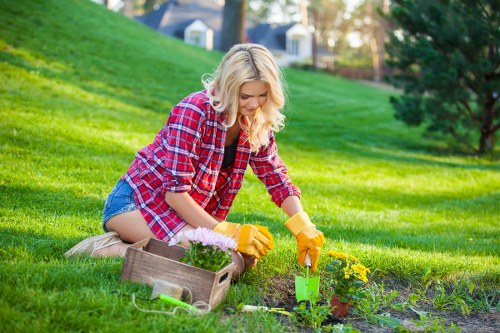
Gardening in Collingwood offers a unique blend of natural beauty and community spirit, making it an ideal location for both novice and experienced gardeners. Nestled in the heart of Ontario, Collingwood is renowned for its picturesque landscapes, which provide the perfect backdrop for a thriving garden. Whether you're interested in ornamental plants, edible gardens, or sustainable gardening practices, Collingwood has something to offer everyone.
The town's climate, characterized by warm summers and mild winters, allows for a diverse range of plants to flourish. Gardeners can take advantage of the extended growing seasons to cultivate a variety of flowers, vegetables, and herbs. Additionally, the local soil composition, rich in nutrients, supports healthy plant growth, reducing the need for excessive fertilizers and pesticides.
In this comprehensive guide, we'll explore the best practices for gardening in Collingwood, including tips on soil preparation, plant selection, seasonal care, and leveraging local resources to enhance your gardening experience. Whether you're looking to transform your backyard or contribute to community gardens, our insights will help you achieve a lush and vibrant garden.
Understanding Collingwood’s Climate for Gardening
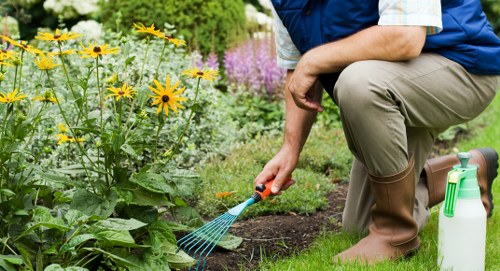
Collingwood enjoys a temperate climate that is highly conducive to gardening. With an average annual temperature of around 8°C (46°F), the region experiences distinct seasons, each bringing its own set of challenges and opportunities for gardeners. The summer months are warm and sunny, providing ideal conditions for planting and growing a wide array of plants. Spring and fall offer cooler temperatures that are perfect for hardening off seedlings and preparing for the next planting cycle.
One of the key considerations for gardeners in Collingwood is the risk of frost. Late spring and early fall frosts can affect sensitive plants, so it's important to choose frost-resistant varieties or implement protective measures such as mulch or frost cloths. Additionally, the area receives moderate rainfall, which generally supports garden health, but gardeners should still be mindful of drainage to prevent waterlogging.
Understanding the local climate patterns allows gardeners to plan their planting schedules effectively, ensuring that their gardens thrive throughout the year. By selecting plants that are well-suited to Collingwood’s climate and employing strategic gardening techniques, you can create a resilient and beautiful garden.
Soil Preparation and Management
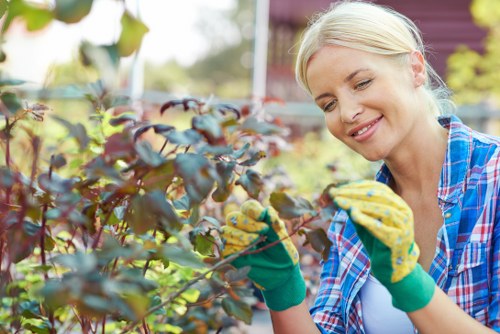
The foundation of any successful garden is healthy soil. In Collingwood, the soil varies from sandy loam to clay, providing a substantial base for various plant types. Conducting a soil test is a crucial first step in understanding your garden’s specific needs. A soil test will reveal the pH level, nutrient content, and texture, allowing you to make informed decisions about soil amendments.
To improve soil fertility, incorporate organic matter such as compost, manure, or leaf mold. These materials enhance soil structure, increase nutrient availability, and promote beneficial microbial activity. Additionally, practicing crop rotation and cover cropping can help maintain soil health and prevent the buildup of pests and diseases.
Proper soil drainage is another critical aspect of soil management. While Collingwood’s moderate rainfall is beneficial, ensuring that your garden beds are well-drained will prevent root rot and other moisture-related issues. Raised beds or the incorporation of gravel and sand can aid in improving drainage, particularly in areas with heavier clay content.
Choosing the Right Plants for Collingwood Gardens
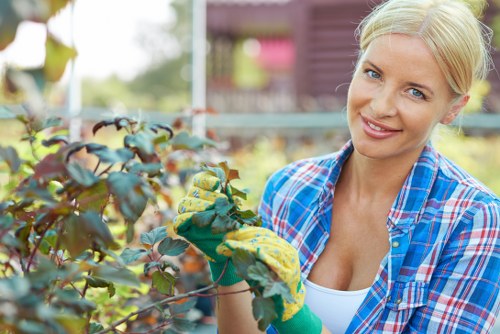
Selecting plants that are well-suited to Collingwood’s climate and soil conditions is essential for a thriving garden. Here are some recommended categories and specific plants:
- Perennials: Plants like hostas, daylilies, and coneflowers are excellent choices for providing year-round beauty.
- Annuals: For vibrant, seasonal color, consider marigolds, petunias, and zinnias.
- Vegetables: Tomatoes, peppers, leafy greens, and root vegetables thrive in Collingwood’s growing conditions.
- Herbs: Basil, rosemary, thyme, and mint are not only useful in the kitchen but also add fragrance and texture to gardens.
- Trees and Shrubs: Maple, oak, hydrangeas, and lilacs offer structure and shade, enhancing the overall garden design.
Additionally, native plants such as black-eyed susans and goldenrod are well-adapted to the local environment and support pollinators like bees and butterflies. Incorporating a mix of native and non-native species can create a balanced and sustainable garden ecosystem.
Seasonal Gardening Tips for Collingwood
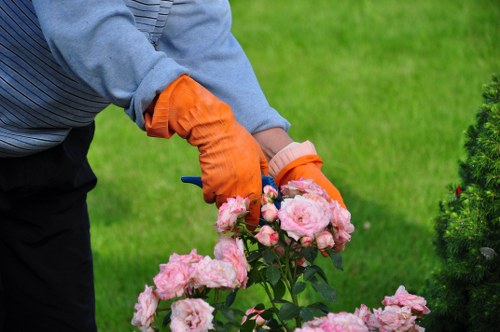
Gardening in Collingwood requires attention to seasonal changes to ensure continuous growth and productivity. Here are some tailored tips for each season:
Spring
Spring is the time to prepare your garden beds by clearing debris and adding compost. Plant early vegetables like peas and lettuce, and sow seeds for perennials and annuals. Protect tender plants from late frosts using cloches or row covers.
Summer
Maintain your garden by watering consistently, especially during dry spells. Mulch helps retain moisture and suppress weeds. Prune shrubs and deadhead flowers to encourage new blooms. Harvest vegetables regularly to promote continuous production.
Fall
As temperatures cool, focus on planting cover crops to enrich the soil for next year. Plant bulbs for spring flowering and divide perennials that have outgrown their space. Clean up fallen leaves and debris to prevent pest infestations.
Winter
Protect your garden from harsh weather by mulching heavily and covering sensitive plants. Indoor gardening can continue with houseplants and hydroponic systems. Plan for the next gardening season by researching new plants and techniques.
By adapting your gardening practices to the seasonal rhythms of Collingwood, you can maintain a productive and aesthetically pleasing garden year-round.
Local Gardening Resources in Collingwood

Collingwood offers a variety of local resources to support gardeners, from nurseries and garden centers to community gardens and workshops. Leveraging these resources can enhance your gardening knowledge and provide access to high-quality plants and tools.
- Nurseries and Garden Centers: Local nurseries like Victoria Seed and Inc. and Ascendant Herb Garden & Café offer a wide selection of plants, seeds, and gardening supplies tailored to the regional climate.
- Community Gardens: Participating in community gardens provides opportunities to connect with other gardeners, share resources, and cultivate shared green spaces.
- Workshops and Classes: Many local organizations and garden centers offer workshops on topics such as organic gardening, composting, and landscape design.
- Gardening Clubs: Joining a gardening club can provide support, inspiration, and access to exclusive events and resources.
Additionally, online forums and social media groups dedicated to Collingwood gardening can be valuable for exchanging tips, troubleshooting issues, and staying updated on local gardening events.
Eco-Friendly Gardening Practices

Embracing eco-friendly gardening practices not only benefits the environment but also enhances the health and sustainability of your garden. Here are some strategies to consider:
- Composting: Recycling kitchen scraps and garden waste into compost enriches the soil and reduces landfill waste.
- Water Conservation: Implementing drip irrigation, rain barrels, and mulching can significantly reduce water usage.
- Organic Pest Control: Use natural pest repellents and encourage beneficial insects to manage pests without harmful chemicals.
- Native Plant Selection: Growing native plants supports local biodiversity and requires fewer resources to maintain.
- Sustainable Materials: Choose eco-friendly materials for garden structures and tools to minimize environmental impact.
By adopting these practices, you can create a garden that is not only beautiful but also sustainable and environmentally responsible.
Landscape Design Tips for Collingwood Gardens

Effective landscape design enhances the beauty and functionality of your garden. Here are some design principles to consider:
- Plan Your Layout: Start with a clear plan that outlines the placement of different plant types, pathways, and garden structures.
- Balance and Harmony: Strive for a balanced arrangement of plants and features to create a harmonious aesthetic.
- Focal Points: Incorporate focal points such as sculptures, fountains, or standout plants to draw attention and add interest.
- Color Coordination: Choose a color palette that complements the natural surroundings and enhances visual appeal.
- Texture and Height Variation: Combine plants with different textures and heights to add depth and dimension to your garden.
Additionally, consider the practical aspects such as sunlight exposure, soil conditions, and maintenance requirements when designing your garden layout.
Gardening Tools and Equipment

Having the right tools and equipment is essential for maintaining an efficient and enjoyable gardening experience. Here’s a list of must-have tools for gardeners in Collingwood:
- Hand Tools: Essential hand tools include trowels, pruners, and cultivators for planting and maintenance tasks.
- Watering Equipment: A reliable watering can or hose with adjustable nozzles ensures your plants receive adequate moisture.
- Soil Tools: Shovels, spades, and rakes are necessary for soil preparation and bed maintenance.
- Protective Gear: Gloves, hats, and knee pads protect you while working in the garden.
- Lawn Care Tools: Mowers, trimmers, and aerators help maintain healthy lawns and garden beds.
Investing in high-quality tools not only makes gardening tasks easier but also ensures longevity and better performance. Local garden centers in Collingwood typically offer a range of tools suited to various gardening needs.
Organic Gardening in Collingwood

Organic gardening focuses on sustainable practices that promote healthy soil, reduce chemical usage, and foster biodiversity. Here are some key principles of organic gardening:
- Natural Fertilizers: Use compost, manure, and other natural fertilizers to nourish your plants without synthetic chemicals.
- Crop Rotation: Rotate plant families each season to prevent soil depletion and reduce pest and disease buildup.
- Companion Planting: Planting compatible species together can enhance growth, deter pests, and improve harvest yields.
- Weed Management: Use mulching and manual weeding to control unwanted plants without herbicides.
- Integrated Pest Management: Employ a combination of biological, cultural, and mechanical methods to manage pests sustainably.
By adopting organic gardening practices, you can create a vibrant, healthy garden that contributes positively to the local ecosystem and provides nutritious produce for your household.
Community and Networking for Gardeners

Gardening in Collingwood is not just an individual pursuit but also a community-oriented activity. Engaging with fellow gardeners can provide support, inspiration, and opportunities for collaboration. Here are some ways to connect with the local gardening community:
- Join Local Gardening Clubs: Participate in clubs that organize events, share knowledge, and foster a sense of camaraderie among gardeners.
- Attend Workshops and Seminars: Enhance your gardening skills by attending educational sessions offered by local experts and organizations.
- Volunteer for Community Gardens: Contribute to shared green spaces, helping to build stronger community ties and gain valuable gardening experience.
- Participate in Plant Swaps: Exchange seeds, plants, and gardening tips with other enthusiasts to diversify your garden and expand your plant collection.
- Engage on Social Media: Connect with regional gardening groups online to share progress, seek advice, and celebrate successes.
Building a network within the gardening community can enhance your gardening journey, providing both practical benefits and a sense of belonging.
Gardening Challenges and Solutions in Collingwood

Like any region, Collingwood presents its own set of gardening challenges. Understanding these obstacles and implementing effective solutions can help maintain a healthy and productive garden.
- Pest Management: Common pests include aphids, slugs, and beetles. Use organic pesticides, introduce beneficial insects, and employ physical barriers to control infestations.
- Disease Prevention: Fungal diseases like powdery mildew can be mitigated by ensuring proper air circulation, avoiding overhead watering, and removing infected plant parts promptly.
- Soil Erosion: To prevent soil erosion, especially on slopes, use ground covers, terracing, and retaining walls to stabilize the soil.
- Watering Issues: Overwatering can lead to root rot, while underwatering stresses plants. Implement a balanced watering schedule and use moisture meters to monitor soil hydration levels.
- Frost Damage: Protect sensitive plants from unexpected frosts by using frost covers, mulch, or relocating potted plants to sheltered areas.
Addressing these challenges with proactive measures ensures your garden remains resilient and continues to thrive despite environmental stresses.
Sustainable Gardening Practices

Sustainability in gardening not only benefits the environment but also enhances the longevity and productivity of your garden. Here are some sustainable practices to consider:
- Rainwater Harvesting: Collecting and using rainwater reduces reliance on municipal water supplies and lowers water bills.
- Composting: Recycling organic waste into compost enriches the soil and reduces landfill waste.
- Energy-Efficient Lighting: Utilize solar-powered or LED garden lighting to minimize energy consumption.
- Reusable Materials: Choose durable, reusable materials for garden structures to decrease waste and maintenance costs.
- Biodiversity: Promote biodiversity by planting a variety of species, which supports a balanced ecosystem and reduces vulnerability to pests.
Incorporating these sustainable practices into your gardening routine helps create a garden that is both beautiful and environmentally responsible.
Gardening with Children and Families

Gardening is a wonderful activity for families, offering educational and recreational benefits for children and adults alike. In Collingwood, there are numerous opportunities to engage children in gardening projects:
- Educational Gardens: Create themed gardens that teach children about plant biology, ecology, and sustainability.
- Hands-On Activities: Involve kids in planting, watering, and harvesting to foster a sense of responsibility and accomplishment.
- Creative Projects: Encourage creativity through garden art, such as painting pots, building fairy houses, or designing garden layouts.
- Community Events: Participate in family-friendly gardening events and workshops to build connections and share experiences.
- Snack Gardens: Grow easy-to-harvest vegetables and herbs that children can use to prepare simple snacks, enhancing their interest in healthy eating.
By involving children in gardening, families can cultivate not only plants but also valuable life skills and cherished memories.
Gardening Trends in Collingwood

Gardening in Collingwood is evolving with various trends that reflect the community's values and environmental consciousness. Some of the popular trends include:
- Vertical Gardening: Maximizing space by growing plants vertically using trellises, wall-mounted planters, and vertical structures.
- Urban Gardening: Embracing gardening in smaller urban spaces, including balconies, rooftops, and patios.
- Permaculture: Designing gardens based on natural ecosystems to create sustainable and self-sufficient living spaces.
- Edible Landscaping: Integrating edible plants into ornamental landscapes, blending functionality with aesthetics.
- Pollinator Gardens: Focusing on plants that attract and support pollinators like bees, butterflies, and hummingbirds.
Staying informed about these trends can help gardeners in Collingwood adopt innovative practices that enhance their gardening experience and contribute to sustainable living.
10-15 Closest Areas to Collingwood for Gardening Enthusiasts

Collingwood is surrounded by several charming areas that offer excellent opportunities for gardening enthusiasts. Here are the 10-15 closest areas to Collingwood, each with its unique features relevant to gardening services:
- Blue Mountain: Famous for its ski resorts, Blue Mountain also boasts beautiful garden areas and local nurseries.
- Horseshoe Valley: Known for its stunning landscapes, it offers community gardens and gardening workshops.
- Scenic Caves: This area provides access to natural springs and fertile soil, ideal for organic gardening.
- Minesing: A peaceful rural area with expansive land perfect for large-scale gardening projects.
- The Blue Mountain Village: Offers a variety of gardening stores and seasonal plant sales.
- Oro: A small community with dedicated gardening spaces and local gardening clubs.
- Alton Township: Features agricultural services and farms supplying local produce and plants.
- Adolphustown: Rich in history, this area includes heritage gardens and traditional gardening techniques.
- Theodore: Provides extensive green spaces and is home to several botanical gardens.
- Clearview: Known for its community initiatives, including shared gardens and eco-friendly projects.
- Stayner: Offers a mix of urban and rural gardening options with access to local resources.
- Avon: Home to numerous flower festivals and gardening exhibitions throughout the year.
- Port Carling: Features waterfront gardens and specialized aquatic plant gardens.
- Uffington: A quaint area with organic farms and sustainable gardening practices.
- Gravenhurst: While slightly further, it provides extensive gardening centers and botanical expertise.
These nearby areas enhance the gardening landscape of Collingwood, offering additional resources, diverse plant selections, and a supportive community for gardeners of all levels.
Maintenance Tips for a Thriving Garden

Maintaining a vibrant and healthy garden requires consistent care and attention. Here are some essential maintenance tips for gardeners in Collingwood:
- Regular Watering: Ensure your plants receive adequate water, especially during dry spells. Early morning is the best time to water to reduce evaporation and prevent fungal diseases.
- Weeding: Remove weeds promptly to prevent them from competing with your plants for nutrients and water.
- Pruning: Trim overgrown branches and dead foliage to encourage healthy growth and improve plant structure.
- Fertilizing: Apply appropriate fertilizers based on your soil test results to provide essential nutrients for plant growth.
- Pest Inspection: Regularly check for signs of pests and diseases, addressing issues promptly to prevent widespread damage.
- Mulching: Apply mulch around plants to retain moisture, regulate soil temperature, and suppress weed growth.
By adhering to these maintenance practices, you can ensure your garden remains lush, productive, and aesthetically pleasing throughout the year.
Harvesting and Enjoying Your Garden

The ultimate reward of gardening in Collingwood is the ability to harvest and enjoy the fruits of your labor. Here are some tips on harvesting and making the most of your garden produce:
- Timely Harvesting: Harvest vegetables and fruits at their peak ripeness to ensure the best flavor and nutritional value.
- Proper Techniques: Use appropriate tools and methods to avoid damaging plants during harvesting.
- Storage: Store harvested produce correctly to extend its shelf life and maintain quality.
- Preservation: Consider preserving surplus produce through canning, drying, or freezing.
- Sharing: Share your harvest with friends, family, and neighbors to foster community spirit and reduce waste.
Enjoying the bounty of your garden not only provides fresh and healthy food but also brings a sense of accomplishment and connection to nature.
Contact us today to start your gardening journey in Collingwood or **book your service now** to transform your outdoor space into a beautiful green haven.
